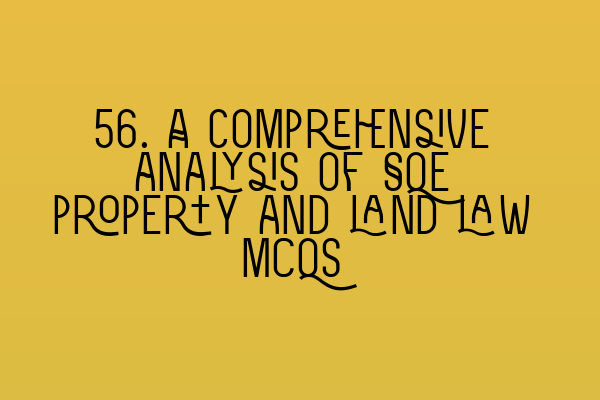56. A comprehensive analysis of SQE property and land law MCQs
Welcome to SQE Property Law & Land Law, where we provide expert guidance and preparation for the Solicitors Qualifying Examination (SQE). In this blog post, we will delve deep into the intricacies of property and land law MCQs, providing you with a comprehensive analysis that will help you excel in your SQE exam. Let’s get started!
To begin with, let’s clarify the importance of understanding property and land law in the context of the SQE. Property law is a fundamental area of legal practice, and a solid grasp of its concepts and principles is essential for any aspiring solicitor. The SQE exam will test your knowledge and application of property and land law through multiple-choice questions (MCQs). It is crucial to have a thorough understanding of the subject matter to answer these questions correctly.
Now, let’s dive into the analysis of the SQE property and land law MCQs. We will cover various topics including legal estates and interests, co-ownership, mortgages, covenants, and easements.
1. Legal Estates and Interests:
MCQs in this category test your understanding of different types of legal estates and interests in land, such as fee simple absolute, leasehold, and life estate. It is important to be familiar with the characteristics and legal implications of each type of estate.
2. Co-ownership:
These questions assess your knowledge of the rights and obligations of co-owners of property, including joint tenancy and tenancy in common. Understanding the concepts of survivorship, severance, and partition is crucial for answering these MCQs accurately.
3. Mortgages:
MCQs related to mortgages focus on the legal aspects of borrowing money against a property, including the rights and duties of mortgagees and mortgagors. Familiarity with foreclosure, redemption, and priorities in mortgage interests is vital to tackle these questions effectively.
4. Covenants:
This category examines your understanding of contractual agreements concerning the use and enjoyment of property. You should be well-versed in the different types of covenants (positive, restrictive, and negative) and their enforceability to tackle these MCQs successfully.
5. Easements:
MCQs on easements test your knowledge of the legal rights and obligations granted to individuals over another person’s land. Understanding the nature, creation, and termination of easements is key to answering these questions accurately.
It is essential to develop a comprehensive study plan that covers all the above-mentioned topics in property and land law. Our SQE 1 Practice Exam Questions and SQE 1 Practice Mocks FLK1 FLK2 articles will provide you with valuable resources to practice and assess your knowledge. Make sure to take advantage of our SQE 2 Preparation Courses as well for a comprehensive understanding of property and land law.
As an SEO expert, it is important to integrate relevant keywords throughout the blog post. Keywords such as “SQE property and land law,” “SQE MCQs,” “Solicitors Qualifying Examination,” “property law,” and “land law” should be strategically included to enhance the visibility of this article.
In conclusion, mastering property and land law is crucial for success in the SQE exam. By dedicating time and effort to understand the various topics and concepts, and by utilizing our practice resources and preparation courses, you can confidently approach the MCQs in the SQE exam. Stay focused, stay determined, and let SQE Property Law & Land Law be your trusted guide on your journey to becoming a qualified solicitor.
For more information on SQE exams and important dates, check out our article on SRA SQE Exam Dates. And don’t forget to explore our SQE 1 Preparation Courses for additional support and guidance.
Good luck with your preparations, and remember, we are here to support you every step of the way!
Disclaimer: The information provided in this blog post is for educational purposes only and does not constitute legal advice. Please consult with a qualified solicitor for any legal matters.
